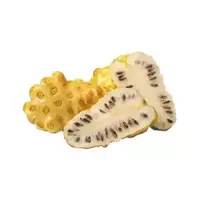Nonie

Exotic for our country, noni fruit, regardless of whether it turned out to be in the hands of scientists from a biochemical laboratory or a folk healer, represents one of the most mysterious natural medicines to date.
Meanwhile, noni fruit is the Hawaiian variant of the plant name, called Morinda citrifolia. In addition to this most common name around the world, there are others - Indian mulberry, cheese fruit and pork apple.
Growing in Polynesia, Malaysia, Southeast Asia and Australia, this evergreen shrub plant has completely different sizes. Noni can be either a small shrub or a tree up to seven meters high with a powerful root system. A special riot is the growth of noni on the islands of the southern coast of the Pacific Ocean, in particular in Tahiti Nui. The trees themselves are able to produce fruits all year round, bringing approximately 800 kilograms of fruit.
The fruit of morinda or noni fruit (which is absolutely the same thing) is completely edible, but its inconspicuous, and sometimes repellent gastronomic qualities do not add to the attractiveness of this product. The bitter taste and sharp unpleasant smell are unlikely to appeal to connoisseurs of juicy sweet and fragrant exotic fruits.
In size and appearance, the noni fruit resembles potatoes, but with a distinctive tubercle surface that is covered with translucent wax skin. The color of the fruits can vary from light yellow, green to almost black. It is noteworthy that, despite the repulsive taste and aroma of fresh fruit, the useful properties of noni are unusually appreciated, thanks to the presence of which a healing drink is made from these fruits - the so-called noni juice.
The benefits of noni
It is known that the noni plant has amazing properties, and therefore for more than one century it has been used by the natives as a drug for diabetes, hypertension and even cancer. The healers of Polynesia claim that the benefits of noni are contained not only in the most fruits, but also in all parts of the plant: leaves, flowers and bark. Local residents treat fever, infections, asthma, diarrhea, constipation, animal and insect bites with fruit juice.
By the way, it was established that the noni juice extract contains more than 150 substances with biologically active characteristics. And this is along with a full range of vitamins and minerals, as well as a significant amount of amino acids.
According to the latest scientific research carried out with noni juice, the Polynesian legend of the extraordinary healing power of this plant is fully justified. Thus, research scientists assure that the benefits of noni for humans are manifested in antibacterial, anti-inflammatory, painkiller, decongestant, anti-cancer and immunostimulatory properties.
noni 44 kCal
Energy value of noni (Ratio of proteins, fats, carbohydrates - ju):
Proteins: 0.1 g (~ 0 kCal)
Fats: 0.3 g (~ 3 kCal)
Carbohydrates: 10g (~ 40kCal)
Energy ratio (bj | y): 1% | 6% | 91%
 Español
Español Français
Français Português
Português Русский
Русский 简体中文
简体中文 繁體中文
繁體中文 日本語
日本語 한국어
한국어 العربية
العربية Türkçe
Türkçe Қазақ
Қазақ Deutsch
Deutsch Italiano
Italiano Українська
Українська
